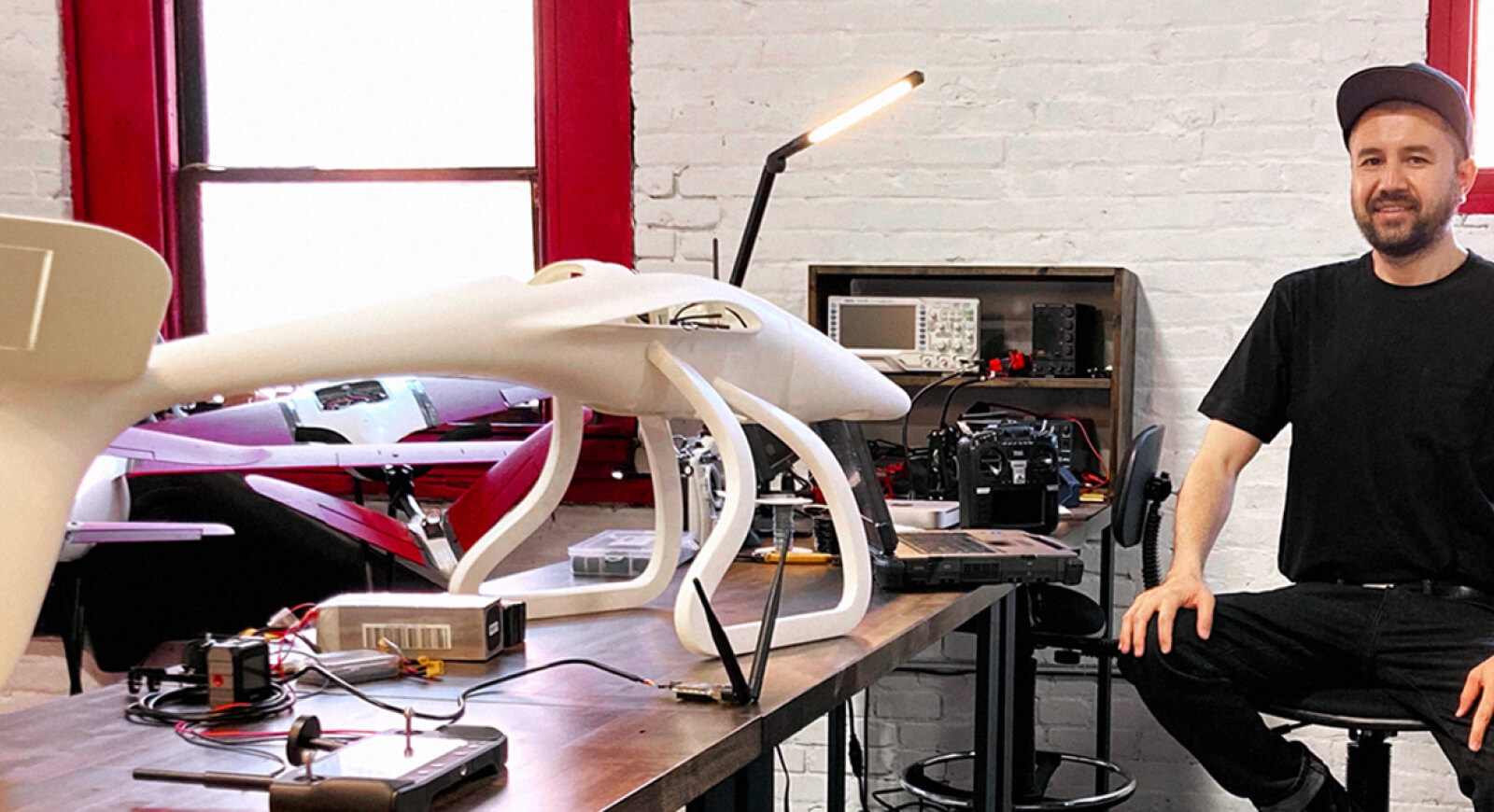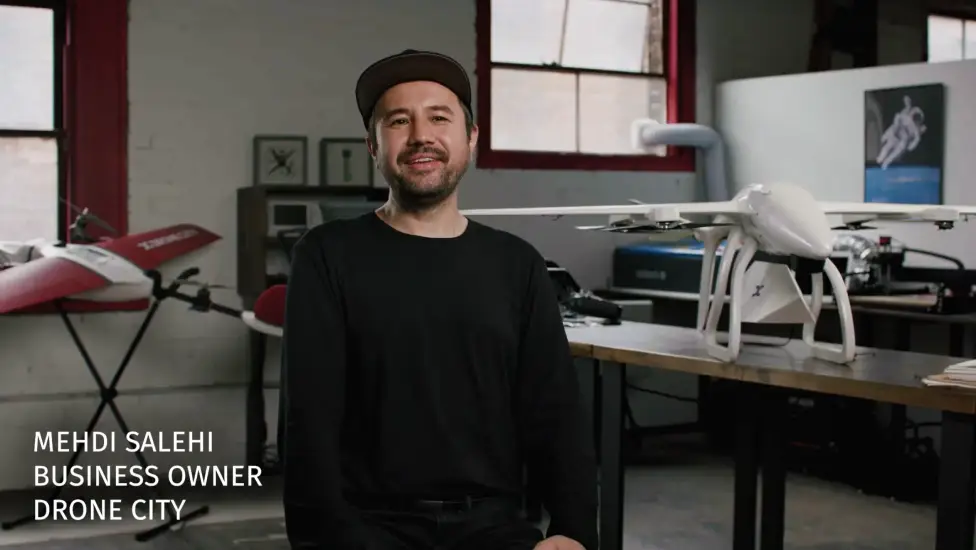Drone business finds a niche to finally reach its goals
Four ways a determined entrepreneur defied the odds to succeed

Key takeaways
- Keep evolving. Monitor your industry and target market and be ready to adjust your business plans to capitalize on changing market priorities.
- Find a mentor. Seek out experienced people who can provide business guidance and advice. The Small Business Administration and industry groups may be able to identify the right mentor.
- Anticipate challenges. Recognize that all business must persevere through some tough times. Build connections with business or industry peers to help you keep perspective on the challenges you face.
- Set goals. Having short- and long-term goals can guide your decision-making, hiring, development and other efforts to keep them on track.

Small Business Community Champion Winner 2022: Drone City
Video
After fleeing from the Taliban in Afghanistan, traveling by foot to Turkey, and then by boat to Greece, Mehdi Salehi came to the United States to build his business. His perseverance, focus and willingness to evolve all helped him steer his company to the success it is today.
Salehi is founder of Drone City, a drone delivery business that focuses on “last-mile” delivery, transporting packages to their final customer destination. This type of service is important for delivering goods directly to the customer where traditional delivery service companies may not have service. Drone City is a winner of a 2022 Citizens Small Business Community Champion Award, which recognizes entrepreneurs striving to improve their community.
It’s been a long and challenging route from the city of Bamyan in central Afghanistan where Salehi was born and raised, to the town of Haverstraw, north of New York City, where his company is now based. As Salehi worked with a four-person team of engineers to design their drone technology over the last eight years, the company morphed to meet the needs of a burgeoning market. Drone City’s new last mile drone delivery model will officially launch this summer.
Salehi —who is also an adjunct professor at Adelphi University, lecturing on drone technology — shares insights from his experience into what’s required to position a business to be ready for success.
Tip: Keep evolving until you find your market opportunity
Salehi and his team founded the first iteration of their business in 2014, a research and development (R&D) lab called Good Drones that focused on using drones for social good. The team also started a nonprofit Drones for Refugees project using the technology to help locate and assist refugees making the perilous Aegean Sea crossing between Turkey and Greece that he himself made years earlier.
The next phase of the company involved a more commercial approach. The team rebranded as Drone Labs to serve companies in construction, media and advertising. While this venture built a customer base and ongoing stream of work, the company didn’t have the niche it needed to grow. A willingness to eventually recognize what the market wanted, rather than sticking with his existing business concept, is what Salehi says helped him find a niche and build his expansion plan.
“We had a wide variety of clients,” he explains. “But we needed to shift from our original vision in order to grow based on what the market indicated it wanted, not what we had planned on doing.”
The need for safety and convenience during the COVID-19 pandemic provided the opportunity the team was looking for and they recognized the chance they had to retool to become Drone City, providing last-mile service. “The demand for contactless delivery gave us a huge opportunity to put our knowledge and track record to finally find the last-mile niche our business needed,” he explains.
Bottom line: Watch what is happening in your industry and community, so you can be ready to capitalize on potential for growth. While changing market conditions can be challenging, they can also present opportunities. “Never be afraid to evolve if the market is telling you something you need to hear,” says Salehi.

Tip: Find a mentor to save you time and resources
When Salehi moved to the United States, he didn’t have friends, family or a professional network. While he eventually built up all three, his advice to others is to prioritize finding a mentor to gain guidance from people who can help you avoid pitfalls and secure resources.
“Experienced advice would have saved us time and helped us get our business on the path to success more quickly,” Salehi notes. “I have multiple mentors now, both on a personal and professional level, and I meet with them on an ongoing basis.”
One area he wishes he had guidance in earlier was how to obtain financing. His team generated capital through client work, rather than securing loans, which Salehi says is a slow route to success. “We just kept hustling, and saving money to fund our R&D,” he says. “Eventually, I connected with a mentor through the Small Business Administration (SBA) program Service Corps of Retired Executives (SCORE), who helped me make better decisions to move my business along at a faster rate.”
Bottom line: You don’t have to go it alone. Resources such as the SBA or professional associations in your industry can connect you with experienced professionals to offer inspiration and support. When you’re established, you can pay it forward. Salehi does this by now serving as a mentor for the next generation through his work teaching introductory drone design at Adelphi University.
“I share real-world examples of collaborating with clients and am brutally honest about the level of work needed to succeed,” he explains. “Some students have gone on to get their Federal Aviation Administration (FAA) licenses and drone piloting certifications and I’m delighted to support them — it’s fulfilling to watch them thrive.”

Tip: Set goals
Clear company objectives simplify decision-making and Salehi recommends setting short- and long-term goals to keep a company on track. Choices about everything from product development, to spending and staffing are easier when you know what you want to accomplish.
While it took the company some time to find its niche and map its course, Salehi has clear objectives for Drone City, which will start test deliveries this summer in the metro New York City area. The company is focused on completing these tests, raising seed money, hiring marketing staff and moving to a larger location to accommodate its expanding operations.
Drone City’s team will also continue to refine its technology. Salehi acknowledges that there are many big players in the drone space, but he believes Drone City has several differentiators that will help the company stand out. Its technology uses a vertical launch system, similar to a helicopter, and then transitions to airplane-style flight once aloft, unlike the catapult system used by many competitors. In addition, the company’s drones use 100% renewable energy, with rechargeable solar batteries. Being environmentally friendly is an important part of Drone City’s mission going forward.
Bottom line: Set clear, measurable goals for your company based on what it needs to do to serve your customers and build your business. Salehi says that this customer focus helps to ensure that company priorities are aligned with market needs. “We know that slow delivery times decrease customer satisfaction and drones have the potential to help delivery companies meet customer demand and stay on schedule,” says Salehi. “In the end, our goals are focused on building a business that sells convenience and reliability, not drone service.”
Related topics

Book publisher finds business success by supporting her community

Ghanaian entrepreneur finds recipe for success with food from his homeland

2022 Small Business Community Champion Award winners
© Citizens Financial Group, Inc. All rights reserved. Citizens Bank, N.A. Member FDIC
Disclaimer: The information contained herein is for informational purposes only as a service to the public and is not legal advice or a substitute for legal counsel. You should do your own research and/or contact your own legal or tax advisor for assistance with questions you may have on the information contained herein.
